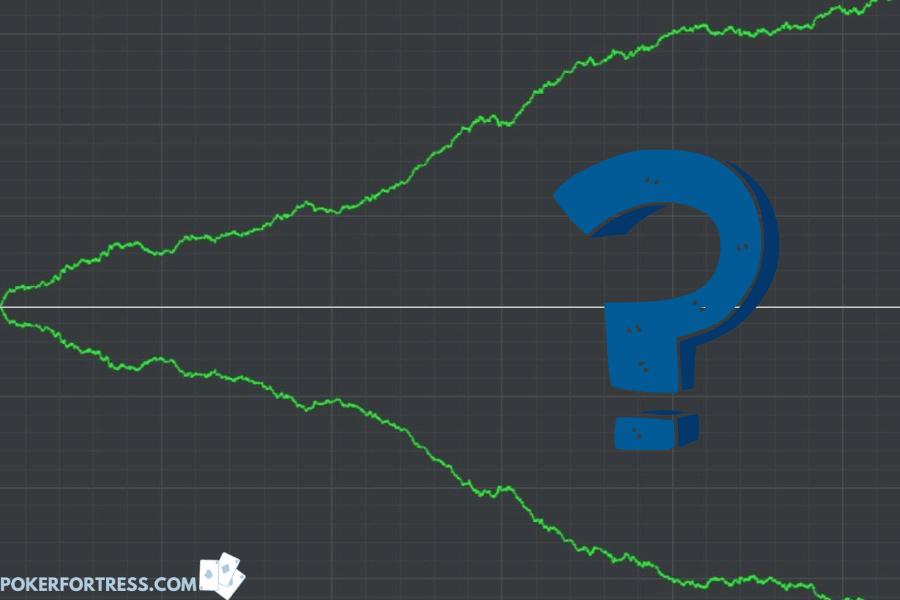If you’re watching a live poker tournament for the first time, you’ll be bombarded with words and phrases that you might be hearing for the first time or something that you use every day. Run is one of the best examples of poker slang. We all know what a run is, but nobody does that while playing poker, right?
Run is a term in poker that refers to how the cards are dealt over time. You can use it to describe the totality of the session, but the run of cards usually refers to a player’s “luck” with cards. When a player is “running bad,” he’s receiving a sequence of bad cards from the dealer.
It’s a simple term in poker, but there are many things that you need to know about a run. It can affect how you play games massively, so you must understand how to handle it. We’ll discuss all of it in great detail, including tips on how you can extract value from your cards and avoid the biggest pitfall for poker players.

Understanding What a Run Is
Many factors can affect a poker game, and one of these is your luck as a player.
If you’re winning a lot of hands against players who are better or at par, just because you always happen to pick up the best cards, you’re running good in poker.
It happens to everyone—amateurs, professionals, and even if you’re only playing with your friends. Often, when you’re running good, it goes way beyond math and probability. There’s no other way to explain why or how you’re running good other than extreme luck.
Here’s a video that shows how Daniel Negreanu – one of the best poker players – took advantage of the run of cards in his favor:
In the video, you’ll see how he’s getting the best hands—and even got a consecutive pocket kings! One could argue that he just had a better hand more often than others, which is true. He’s having a good run that he’s getting the best hands pre-flop. However, some players destroy poker’s math and probability; they’re winning even with weak hands!
Here’s a video that shows Dan Smith, running so good that even with relatively weak hands pre-flop, he still manages to win massive pots:
On the other hand, some players are having a sequence of bad hands. We refer to it as running bad or just bad luck. It happens to every poker player; it could last for an hour or a couple of sessions. There are even some players who are claiming that they’re running bad for months!
However, if you’re already on a losing streak for months, it’s probably the right time to reconsider the games that you play and the strategies that you use. Luck has a significant impact on your games, but if it happens often, then it could be because of something else.
What if You’re Always Running Bad?
When you’re winning, you’re feeling ecstatic, like you’re the best poker player in the world.
Every player celebrates their wins, but what separates an amateur from a professional is how they treat their losses.
The best time for you to improve as a player is when you lose. However, if you always lose and blame it on running bad, there’s nothing you can improve, right? Professionals know that running bad happens to everyone, but if it happens to them, they review everything and see if it was because of luck or something that they did wrong.
Many players fail to improve their game because whenever they lose, they always think that they’re just running bad, and things will eventually get better. If you’re losing for months, it might have something to do with your luck or any of the following reasons:
You’re Playing at the Wrong Tables
You don’t have to keep losing for months to realize that you’re playing at the wrong table. If you keep losing games, you may be playing with players who are more experienced than you.

There are bad, good, and great players in poker, but it’s all relative to the situation. You might be a great player when you’re with friends, but if you sit at a table with players who are more experienced than you, then running bad should be the least of your worries.
Even if you have the best hands, a poker player with far more experience than you could exploit your weaknesses and extract value even with a much weaker hand. Poker requires a combination of some luck and a lot of skills. Although it can happen, most players can’t win a tournament just because they got lucky.
So if you’ve been losing for months already, be sure to consider where those losses came. There’s nothing wrong with playing against players who have more experience than you because it’ll help you improve. But before you blame your losses on running bad, you should first look at the tables you’re playing.
You Lack the Fundamentals and Skills
If you’ve played with all kinds of players, and are still losing—even against bad players, it might have something to do with your fundamentals and overall skills.
Learning the right fundamentals is one of the most crucial steps that you need to take to become a better poker player.
It’s responsible for all the decision-making processes that you make when you’re at the poker table. Some of the best poker players only had two things: the right fundamentals and willingness to improve.
Phil Ivey is one of the players who had the right fundamentals and strong will to learn the game. Whenever you hear an interview with him, Ivey always talks about how hard he studied the game, and he’s confident that he’s studied it more than any other player in the world.
If you’re on a losing streak and think that you’re only running bad, you deprive yourself of a valuable chance to improve as a player. So before you even think that the only reason you’re losing is that you’re running bad, consider whether you have the right fundamentals and skills to win the game.
You’re Tilting and Lost Control

Running bad and tilt are intertwined, but they don’t mean the same thing. Both happen to everyone, but the difference lies in the effect that it has with players. Running bad has deprived many players the chance to improve. On the other hand, tilt has taken down more poker players than anything else.
It’s easy to tilt when you’re running bad. Imagine having premium hands only to flop air and lose the pot, consecutively. That can tilt even the best players in the world, and we have this video to show you just how bad tilt can affect someone like Tony G:
Running bad will always be based on your luck, but you can still do something to control the pot and manage your risks. When you tilt, you play too aggressively that the decisions you make can potentially end your bad run too soon. Always be mindful of tilt because it will take you down a lot faster than running bad ever would.
Conclusion
When you use the term run to describe how a player picks up his cards, we can say that it always has something to do with luck. If a player is running bad, it means that he’s getting bad hands more often than everyone else at the table.
When you’re losing a lot of games, it’s easy to blame losses with running bad. However, doing this deprives you of a valuable chance to improve. Often, the reason you’re losing games is that you’re playing against more experienced players, or you have weak fundamentals and skills. The more alarming reason you’re losing games is tilt. Knowing when you tilt and what to do with it is what separates average from professional players.



